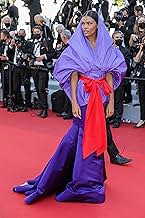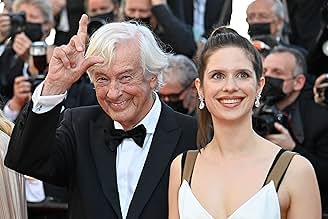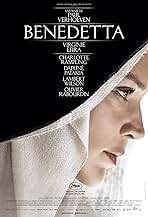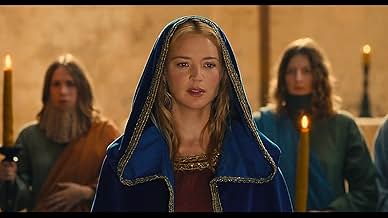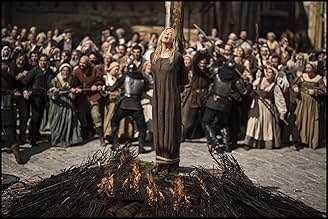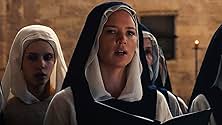A 17th-century nun in Italy suffers from disturbing religious and erotic visions. She is assisted by a companion, and the relationship between the two women develops into a romantic love aff... Read allA 17th-century nun in Italy suffers from disturbing religious and erotic visions. She is assisted by a companion, and the relationship between the two women develops into a romantic love affair.A 17th-century nun in Italy suffers from disturbing religious and erotic visions. She is assisted by a companion, and the relationship between the two women develops into a romantic love affair.
- Awards
- 3 wins & 21 nominations
Storyline
Did you know
- TriviaProduction ended November 2018, and the film was initially scheduled for release at the Cannes Film Festival in 2019, but in December 2018, director Paul Verhoeven had to undergo surgery for a hip injury suffered due to the set's location, which involved lots of hills and climbing. Post-production in Amsterdam had to be delayed until June 2019 to allow time for him to recover from his surgery. However, subsequent complications from pain medication caused an intestinal obstruction that ended in a life-threatening colon perforation; fortunately, Verhoeven's wife urged him to go to the hospital in time. Verhoeven and producer Saïd Ben Saïd agreed to delay the release to 2020 in order for Verhoeven to recover, and be fully present during the post-production process. Verhoeven still credits his editor Job ter Burg for finishing much of the film on his own while he himself was recovering and unable to attend. Eventually, the world-wide COVID-19 pandemic caused the movie to be delayed for another year.
- GoofsAfter the nuncio has demonstrated the pear of anguish, it is nearly closed again, but when he hands it to the torturer it is suddenly opened.
- Quotes
Benedetta: Pride is a sin.
Soeur Jacopa: We're all entitled to a sin. What's yours?
- ConnectionsFeatured in Javo & Temoc: Top 10 Películas: Lo "mejor" del año (2022)
Featured review
Dutch grandmaster Paul Verhoeven has never made a secret of his very ambiguous attitude towards religion, often comparing it to a mass-delusion shared by the majority of the world. However, he has also admitted to his fascination with faith on numerous occassions, and in his movies, religious allegories are never far away: from Alex Murphy in RoboCop seemingly walking on water, to a catholic cross used to trap someone in a coffin in Blackbook.
Religious visions had already played a prominent part in Verhoeven's Dutch classic The Fourth Man and his American debut Flesh + Blood, but Benedetta is his first foray into organized religion as a setting for a full movie. Though based on a book about a real historic figure, Benedetta is far from a simple biopic. We learn enough of the life of the titular character, but Verhoeven is far more interested in exploring our human shortcomings, and one question in particular: to what extent can people really surrender to faith, and all the rules and regulations that come with their system of belief?
The cynic side of his vision is pretty clear in the beginning, when we learn that a religious order is just like any other business model, only accepting novices for financial compensation; their laws, standards and knowledge seem arbitrary and without any logical basis (usually in favor of men); and independent girls who display too much of a critical opinion about religious rules are quickly silenced. While sister Benedetta (Virginie Efira, who played the neighbor in Verhoeven's 'Elle') suddenly receives a series of visions of Jesus, it makes her believe that she was meant to lead, rather than just blindly follow her superiors. And the sudden arrival of the young and handsome novice Bartolomea strongly challenges her views and former teachings.
Both events serve as story catalysts that severely upset the order of things: Benedetta has always been thaught that lust, especially for another woman, is sinful, but when the free-spirited Bartolomea shows her the carnal pleasures, it is clear that such beliefs don't go very deep. Verhoeven almost revels in showing that some of the higher-ups in the church aren't very strict with there vows either, especially when these don't serve their self-interests. But when Benedetta's miracles and inexplicable acts elevate her standing at the expense of others, it becomes clear how easily some people can hold on to ruling dogmas and regulations as long as they believe that these serve the common good; but as soon as these threaten their own power, status and desires, all religious charity and love for the fellow man go out of the window, and sinful human shortcomings such as jealousy, pride and greed quickly take over.
Verhoeven introduces yet another one of his strong but flawed protagonists, by making Benedetta a woman who manages to rally other people to her cause, in spite of the anti-feminist sentiments of the era. He shows that even though the divine may be largely a physical and mental illusion, the power of religion isn't necessarily evil, and can be used for good. At the same time, his Benedetta is definitely no saint: he explicitly allows for the possibility that her miracles are partially manipulated. However, he cleverly doesn't answer the question whether she truly believes that God is using her body for his works, or that she is knowingly manipulating everyone from the start under the pretense of piety.
As expected, production design and cast are great. Virginie Efira can easily sell her naive character, but we still believe that there can be a calculated demeanor under that. Daphne Patakai is amazing in a very brave role as the whirlwind Bartolomea, and Lambert Wilson is just the right guy to play a pompous and self-serving church leader. Possibly the best work comes from Charlotte Rampling as the abbess, whose moral ambiguity seeps through best; she can believably switch between a money-hungry leader, ruthless opportunist and devout believer, even within scenes.
After his more subtle movie 'Elle', Verhoeven is back to his old trade: all the animalistic sides of human beings, like sex, violence, blood, feces, rape and torture, are amply represented. Some people seem to get hung up by the almost 1980s-grade amounts of nudity that they believe takes away from the feminist undertones, but the man himself has made it clear during the film's promotion that there is (and should be) nothing abnormal about sexuality and nudity in films about the human condition. Indeed, he doesn't hold back in that regard, with the creative use of a Maria statue as the film's most memorable moment. Verhoeven, always the provocateur, seems to openly challenge the contemporary negative attitude towards sex in movies, as if to say that we shouldn't be so squeemish about a bit of skin, or reduce a movie simply to the amount of naked women in it. And indeed, after some initial awkwardness in the audience, I felt that most viewers gradually went with it.
Despite all the Verhoeven ingredients being present, I don't feel that this is another one of his masterpieces, though. Where he normally has a brisk pacing and keen sense of dosing, the first half meanders a bit because there is a lot of set-up to be done. Another complication is that Benedetta's visions are depicted in an almost B-movie kind of way, which is almost unintentionally comical. The second half is where the slowly built-up conflict pays off, and although the movie doesn't have as many memorable scenes as some of his classics, one nasty torturing scene and a riveting climax surely make it an experience you will not soon forget.
This is an adequately made morality tale in the vein of The Name of the Rose, highly recommended for people who are interested in history and religion, and for fans of Paul Verhoeven.
Religious visions had already played a prominent part in Verhoeven's Dutch classic The Fourth Man and his American debut Flesh + Blood, but Benedetta is his first foray into organized religion as a setting for a full movie. Though based on a book about a real historic figure, Benedetta is far from a simple biopic. We learn enough of the life of the titular character, but Verhoeven is far more interested in exploring our human shortcomings, and one question in particular: to what extent can people really surrender to faith, and all the rules and regulations that come with their system of belief?
The cynic side of his vision is pretty clear in the beginning, when we learn that a religious order is just like any other business model, only accepting novices for financial compensation; their laws, standards and knowledge seem arbitrary and without any logical basis (usually in favor of men); and independent girls who display too much of a critical opinion about religious rules are quickly silenced. While sister Benedetta (Virginie Efira, who played the neighbor in Verhoeven's 'Elle') suddenly receives a series of visions of Jesus, it makes her believe that she was meant to lead, rather than just blindly follow her superiors. And the sudden arrival of the young and handsome novice Bartolomea strongly challenges her views and former teachings.
Both events serve as story catalysts that severely upset the order of things: Benedetta has always been thaught that lust, especially for another woman, is sinful, but when the free-spirited Bartolomea shows her the carnal pleasures, it is clear that such beliefs don't go very deep. Verhoeven almost revels in showing that some of the higher-ups in the church aren't very strict with there vows either, especially when these don't serve their self-interests. But when Benedetta's miracles and inexplicable acts elevate her standing at the expense of others, it becomes clear how easily some people can hold on to ruling dogmas and regulations as long as they believe that these serve the common good; but as soon as these threaten their own power, status and desires, all religious charity and love for the fellow man go out of the window, and sinful human shortcomings such as jealousy, pride and greed quickly take over.
Verhoeven introduces yet another one of his strong but flawed protagonists, by making Benedetta a woman who manages to rally other people to her cause, in spite of the anti-feminist sentiments of the era. He shows that even though the divine may be largely a physical and mental illusion, the power of religion isn't necessarily evil, and can be used for good. At the same time, his Benedetta is definitely no saint: he explicitly allows for the possibility that her miracles are partially manipulated. However, he cleverly doesn't answer the question whether she truly believes that God is using her body for his works, or that she is knowingly manipulating everyone from the start under the pretense of piety.
As expected, production design and cast are great. Virginie Efira can easily sell her naive character, but we still believe that there can be a calculated demeanor under that. Daphne Patakai is amazing in a very brave role as the whirlwind Bartolomea, and Lambert Wilson is just the right guy to play a pompous and self-serving church leader. Possibly the best work comes from Charlotte Rampling as the abbess, whose moral ambiguity seeps through best; she can believably switch between a money-hungry leader, ruthless opportunist and devout believer, even within scenes.
After his more subtle movie 'Elle', Verhoeven is back to his old trade: all the animalistic sides of human beings, like sex, violence, blood, feces, rape and torture, are amply represented. Some people seem to get hung up by the almost 1980s-grade amounts of nudity that they believe takes away from the feminist undertones, but the man himself has made it clear during the film's promotion that there is (and should be) nothing abnormal about sexuality and nudity in films about the human condition. Indeed, he doesn't hold back in that regard, with the creative use of a Maria statue as the film's most memorable moment. Verhoeven, always the provocateur, seems to openly challenge the contemporary negative attitude towards sex in movies, as if to say that we shouldn't be so squeemish about a bit of skin, or reduce a movie simply to the amount of naked women in it. And indeed, after some initial awkwardness in the audience, I felt that most viewers gradually went with it.
Despite all the Verhoeven ingredients being present, I don't feel that this is another one of his masterpieces, though. Where he normally has a brisk pacing and keen sense of dosing, the first half meanders a bit because there is a lot of set-up to be done. Another complication is that Benedetta's visions are depicted in an almost B-movie kind of way, which is almost unintentionally comical. The second half is where the slowly built-up conflict pays off, and although the movie doesn't have as many memorable scenes as some of his classics, one nasty torturing scene and a riveting climax surely make it an experience you will not soon forget.
This is an adequately made morality tale in the vein of The Name of the Rose, highly recommended for people who are interested in history and religion, and for fans of Paul Verhoeven.
- How long is Benedetta?Powered by Alexa
Details
- Release date
- Countries of origin
- Official sites
- Languages
- Also known as
- Blessed Virgin
- Filming locations
- abbaye cistercienne, Le Thoronet, Var, France(convent interiors)
- Production companies
- See more company credits at IMDbPro
Box office
- Budget
- $24,350,000 (estimated)
- Gross US & Canada
- $354,481
- Opening weekend US & Canada
- $136,839
- Dec 5, 2021
- Gross worldwide
- $4,265,353
- Runtime2 hours 11 minutes
- Color
- Sound mix
- Aspect ratio
- 2.39 : 1
Contribute to this page
Suggest an edit or add missing content







